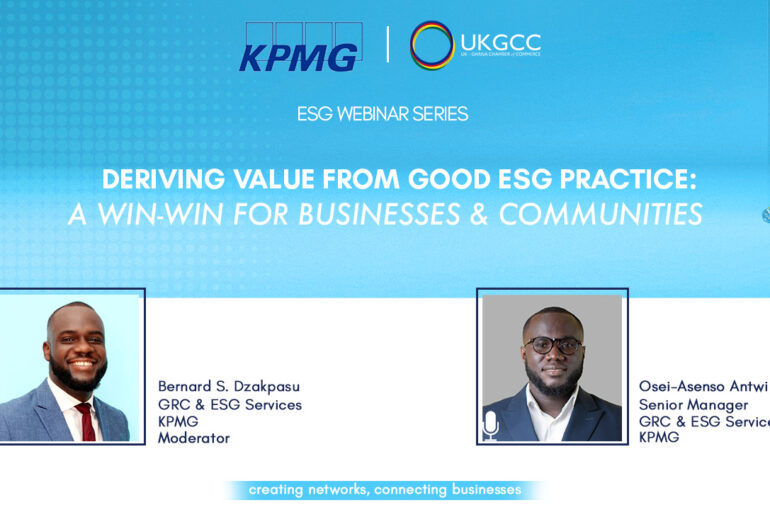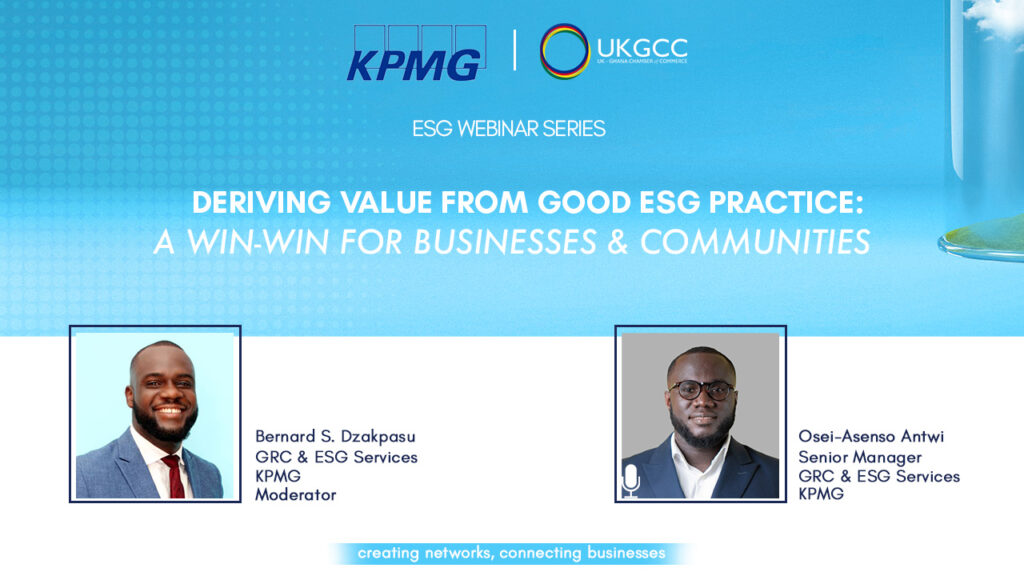Ghanaian businesses urged to embrace good ESG practices to enhance access to funding
Ghanaian businesses urged to embrace good ESG practices to enhance access to funding


Osei-Asenso Antwi, a Senior Manager with KPMG Ghana’s Governance, Risk & Compliance (GRC) and Environment, Social, Governance (ESG) & Sustainability Service lines has urged Ghanaian businesses to embrace good ESG practices. Doing this, he opined, will unlock such benefits as access to finance through increased cashflow, investments, and reduced interests.
Addressing a UK-Ghana Chamber of Commerce (UKGCC) and KPMG Ghana webinar on “Deriving Value from Good ESG Practice: A Win-Win for Businesses and Communities”, Mr. Antwi remarked that “There’s a lot of funding that investors have made available to mitigate global risks and drive the achievement of the UN’s Sustainable Development Goals. Once a business is able to integrate ESG into their operations, they are able to tap into some of these funds.
These come in the form of increased cashflow from banks which provide loans at reduced interest rates tied to ESG performance”.
According to Mr. Antwi, Ghanaian businesses that embrace good ESG practice can also secure funding from investors seeking both financial returns and positive social or environmental impact through impact investing, in addition to generating revenue from reducing emissions or investing in offset projects.
ESG-centred Ghanaian businesses can also access Green bonds which entails the issuing of bonds by banks specifically for environmentally friendly projects, and attract investors seeking sustainable investments.
“Funding is available. As a business, once you consciously integrate ESG into your business, you’ll be able to access the funds your business needs to thrive”, he added.
In addition to access to finance, Mr. Antwi explained that a Ghanaian business that embraces good ESG practices will benefit from reduced costs, enhanced brand reputation, and improved employee morale.
What is ESG?
Mr. Antwi defined ESG as “a metric used to measure and report on the adoption and implementation of strategies that meet the needs of the enterprise and its stakeholders today while sustaining the resources, both human and natural, that will be needed in the future”.
ESG comprises three pillars of Environment, Social, and Government. The Environment pillar considers such factors as climate change, Greenhouse Gas (GHG) emissions, and resource depletion among others.
Factors considered under the “Social” pillar include working conditions, employee relations and diversity, and health and safety while factors considered under the “Governance” pillar include bribery and corruption, board diversity and structure, and tax strategy.
A Practical Approach to Integrating ESG in your Business
Osei-Asenso Antwi encouraged businesses to adopt the Diagnose, Strategise, Implement and Report ESG framework to help businesses successfully integrate ESG and balance its benefits to the planet, people, and profit.
Diagnose, he said, entails carrying out a materiality and maturity assessment that outlines a business’ positioning and priorities regarding its ESG initiatives and impact.
“It is important that as a business, you understand what is material to you, and the risks you are exposed to”. Once you have diagnosed your business, you need to strategise by consciously aligning with your ESG criteria, setting your ambitions, and defining your ESG strategy.
While most businesses end at strategy definition, Mr. Antwi urged them to go a step further by implementing the strategy and finally, reporting through continuous measurement and monitoring, stakeholder engagements, and accountability reporting.
He was optimistic that once businesses embed this framework into their businesses, they will stand a better chance of unlocking the benefits ascribed to good ESG practice.
The webinar, moderated by KPMG Ghana’s Bernard S. Dzakpasu, discussed a range of related topics including the drivers of ESG adoption, and regulatory frameworks that exist in Ghana to prevent greenwashing.
-END-



